Commentary on Luke 6:26
Verse: "Woe unto you, when all men shall speak well of you! for so did their fathers to the false prophets."
Introduction
This verse forms part of a larger discourse known as the "Sermon on the Plain," where Jesus contrasts the blessed state of those who follow Him with the dire consequences that come to those who are esteemed by men. Understanding the implications of such statements is crucial for pastors, theologians, and scholars as they navigate the complexities of living as a Christian in a world often at odds with divine principles.
Contextual Analysis
In Luke 6, Jesus delineates a clear division between the community of His followers and the sinful world. The blessings pronounced in verses 20-23 stand in stark contrast to the woes in verses 24-26, illustrating the upside-down nature of God’s kingdom.
Public Affirmation and Woe
Jesus warns against the peril of being well-spoken of by all. The phrase "when all men shall speak well of you" indicates a universal approval that is often rooted in a shared value system contrary to God’s Kingdom. This universal acceptance is a warning; it signifies a deviation from truth and often aligns with behavior that resembles the conduct of those who reject God, akin to the false prophets of old.
Commentary Insights
- Matthew Henry: Henry articulates that the approval of men can often accompany compromise and unfaithfulness in spiritual matters. He emphasizes that although Christians may suffer for their faith, they should find peace in their alignment with God rather than the fleeting praise of the world.
- Albert Barnes: Barnes reflects on how this phenomenon of public acclaim can lead believers to abandon their convictions. He cautions that seeking the favor of men over God creates a dangerous precedent where the truth becomes secondary to pleasing others. Barnes also connects the idea of false prophets being falsely honored as a reflective warning about the nature of public sentiment towards God’s messengers.
- Adam Clarke: Clarke dives deeper into the implications of “woe” pronounced by Jesus. He notes that this condemnation speaks not only to the character of those praised but also to the society that elevates them. Clarke outlines how the popularity of a prophet or preacher does not equate to their truthfulness and warns that those who are popular in a corrupt society are often those leading many astray.
Theological Implications
This verse opens a discussion on the relationship between cultural acceptance and spiritual fidelity. There is a clear tension between being a faithful witness for Christ and being well-liked in a society that often opposes His message.
The Following Are Key Theological Insights:
- Identity in Christ: This text prompts discussion on the identity Christians claim. As followers of Christ, they are to expect rejection and revilement, illustrating that their primary allegiance lies with Him rather than societal norms.
- Countercultural Discipleship: Jesus' teachings call for a transformative understanding of what it means to follow Him. Discipleship often requires an embracing of social scorn rather than societal applause.
- Prophetic Integrity: The notion of prophetic integrity comes to the forefront. In seeking to uphold truth, are believers willing to endure the suffering that accompanies faithfulness? True prophets, as depicted in Luke 6:26, speak God’s message regardless of the immediate societal repercussions.
Practical Applications
For pastors and teachers, Luke 6:26 demands exploration of how to exhort congregants toward authenticity in their faith while relinquishing the temptation of seeking public approval at the cost of gospel integrity.
- Encouragement in Rejection: Pastoral leaders must encourage believers facing criticism or disdain from the world to see such experiences as marks of authenticity.
- Teaching on the Cost of Discipleship: Educators should emphasize the importance of understanding that the Christian walk may lead to societal rejection just as it led Jesus to the cross.
- Fostering a Community of Vulnerability: Creating a church environment where individuals can share struggles, including the pressures of seeking approval, fosters authenticity and dissuades the sin of pretense.
Conclusion
Luke 6:26 serves as an urgent reminder of the nature of true Christian living. It invites deep reflection on the values we hold and advocate. As scholars, pastors, and students engage with this profound warning, may we all be aligned with the path of truth over public dimension, finding hope in Christ alone, who faced the ultimate rejection for our sake.


